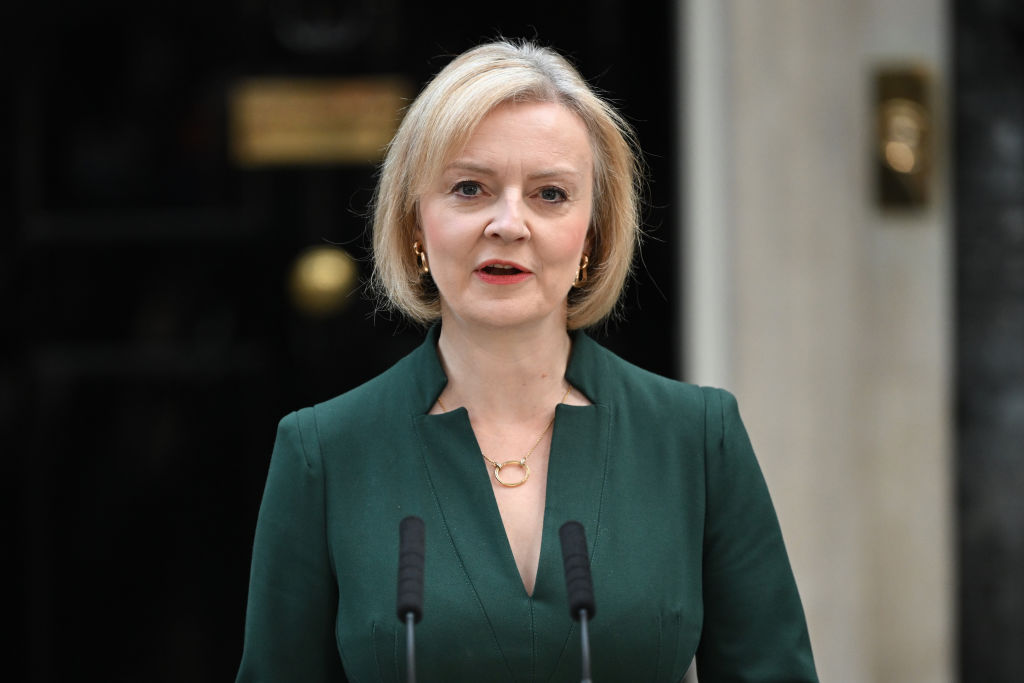After three months of silence, Liz Truss has spoken out – first in a 4,000-word article for the Telegraph and now in a 50-minute-long interview with the Spectator. Truss, the shortest-serving Prime Minister in British political history, feels enough time has now elapsed to give her account of her 49-day premiership, the collapse of which was caused by a combination of the financial and political markets. As the co-author of a book on her long rise and rapid fall, I was intrigued to hear Truss speak for the first time publicly about where it all went wrong.
Both the interview and article make clear that Truss’s time in No. 10 has not fundamentally altered her or her political beliefs. Truss’s faith in free markets still burns bright; tax cuts remain the cure to our ails. The prose in her piece was dry, dispassionate but mercifully devoid of self-pity – with a few characteristically catty swipes at her enemies. In her interview she displayed the same relaxed self-restraint which marked her 60-second resignation statement outside No. 10, with none of the tears of Theresa May or the self-indulgent rhetoric of Boris Johnson.
She notably ducked the chance to say the 45p tax cut in her mini-Budget was a mistake and insists that ‘raising taxes’ won’t ‘lead to reducing debt in five years’ time.’ Her central argument in both is that her economic agenda was thwarted by, first, a ‘powerful economic orthodoxy’ – embodied in much of the Treasury, OBR and the Bank of England – and, second, a lack of political support.
It is the tragedy of Liz Truss that such a diagnosis of Britain’s economic woes will forever be clouded by her lack of political nous. There are reasonable criticisms to make of Andrew Bailey, the Bank of England Governor, and his handling of the double-digit inflation crisis of the past year. The Treasury – and virtually everyone else – appear to have been taken by surprise by the exposed vulnerabilities (and mismanagement) of liability driven investments, which pension funds use to cover their obligations.
Truss repeatedly claims in her interview that neither she nor the Chancellor were kept abreast of these developments, declaring that ‘our assumption was that we’d worked out these plans with Treasury officials… if there had been a major problem it would have been flagged to us.’ This begs the question then as to why her government tried to pick simultaneous fights with the Treasury, OBR and BoE by respectively sacking Tom Scholar, blocking independent forecasts and making clear that they wanted nothing to do with the Bank prior to the market meltdown.
It is the tragedy of Liz Truss that such a diagnosis of Britain’s economic woes will forever be clouded by her lack of political nous
Truss’s version of events can sound almost technocratic at times, with her role stripped of any agency. She complains, for instance, that ‘the political support I had during my time in Number 10 wasn’t enough to achieve the type of bold reforms I was looking to achieve’. But she was the one who chose to disband the No. 10 delivery unit on day one of her premiership, cut key lieutenants out of the decision process and reduce the number of officials under her control. She chose to sack virtually every Sunak supporter from the Cabinet rather than bind potential troublemakers like Michael Gove and Grant Shapps to her side.
Her account of the market reaction to the mini-Budget tax cuts omits Kwasi Kwarteng boasting there was ‘more to come’ – a pledge that could only serve to spook the already-jumpy markets. Some of Truss’s supporters like Simon Clarke have admitted frankly that spending reductions were planned last summer to balance out the tax changes. Truss does not address this shift in thinking which appears to have occurred in late August, when she and her closest aides were based at Chevening. This crucial period is where some of her key allies believe it all began to go wrong, rather than, as she suggests, a month later in No. 10.
These choices reflect the fact it was politics, not economics, which brought down Liz Truss. As one sympathiser put it to me ‘She tried to do seven years of Thatcherism in seven weeks.’ Rather than copy Thatcher in carefully picking her battles, Truss consciously tried to overturn a decade of economic orthodoxy all at once, taking on the consensus in the City, Westminster and Whitehall. She was routed as a result – the latest casualty in post-war politics who sought to defy the markets. In the process she demonstrated both her willingness to defy convention and an ignorance about the history, purpose and practice of institutions like the Treasury.
In her Telegraph piece Truss writes that ‘the experience of last autumn was bruising for me personally, but it taught me a lot and I will expand upon the lessons I have learnt in the coming weeks and months.’ If she had consumed as much Hennessy as she has Hayek she might have learned such lessons sooner – and still be in Downing Street.







Comments